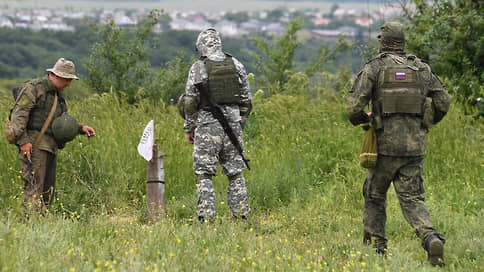The State Duma will consider a number of new initiatives related to the special operation
[ad_1]

The Council of the State Duma on Tuesday morning will approve the procedure for the work of the chamber for this week. The preliminary plans include several issues related to defense and security. Thus, the deputies will raise the draft age, allow people with a criminal record to serve on a contract basis, and establish the right of priority admission to schools and kindergartens for children of participants in a special military operation (SVO) in Ukraine. A draft law on blocking information containing proposals for financing the enemy in the context of an armed conflict will also be considered.
The Duma Committee on Defense last week recommended the adoption in the first reading of a bill that allows citizens who have a criminal record or are recognized as partially fit for military service to enter it under a contract (in this case, the criminal record will be extinguished). The exception will be persons convicted of rape, terrorism, treason, espionage and a number of other grave and especially grave crimes. The project was submitted to the Duma on May 31 by the head of the defense committee, Andrei Kartapolov, and his deputy, Andrei Krasov (both United Russia members). In the explanatory note, they note that many Russians want to enter the military under a contract, but do not have a legal right to do so. The committee’s conclusion also states that it is necessary to adopt amendments to the Criminal and Criminal Procedure Code in order to provide for such persons the procedure and grounds for exemption from punishment, cancellation of a criminal record, suspension of preliminary investigation and termination of criminal prosecution.
Also this week, the Duma will consider in the first reading a bill of deputies from the Defense Committee on a phased increase in the draft age: from 2024, citizens aged 19 to 30 will be drafted into the army, from 2025 – from 20 to 30 years, from 2026 th – from 21 to 30 years. In the explanatory note, the authors explain their initiative by the desire to guarantee young people an education. In addition, according to their calculations, this will reduce the cost of medical examination of conscripts receiving general or secondary vocational education by more than 639 million rubles. in year.
The agenda of the June 14 plenary session is scheduled to include amendments to the law “On the Status of Servicemen”, introduced by a group of senators and deputies (including leaders of all factions), on priority admission to schools and kindergartens of children of SVO participants. Also, the opposition’s initiatives on deferrals from the call for mobilization, which the deputies introduced immediately after its announcement in the fall of last year, will be submitted for consideration. Thus, communist Mikhail Matveev proposed to exempt doctors and candidates of sciences, as well as citizens who did not serve in the military, from mobilization, and New People advocated a delay for individual entrepreneurs and heads of farms. All these proposals were recommended by the Defense Committee for rejection.
This week, the first reading of the amendments to the law on the protection of information, prepared by members of the Duma commission to investigate the facts of foreign interference in the affairs of Russia, is also expected. The authors propose to give the Prosecutor General and his deputies the authority to restrict access to “information containing a proposal to finance the enemy in the context of an armed conflict, hostilities, a counter-terrorist operation or other actions using armed equipment, in which the Russian Federation takes part, as well as information on possible methods implementation of such funding. As stated in the explanatory note, during the period of the JMC “numerous facts of the participation of foreign media platforms and organizations in the dissemination of information with proposals for financing the Armed Forces of Ukraine and on possible ways of providing such financing” were established, which poses a threat to Russia’s security.
In addition, this week the Duma will consider in the second reading amendments to the Code of Administrative Violations from a group of deputies led by United Russia member Anton Gorelkin on liability for the illegal use of foreign instant messengers. Since March, their use for sending personal data by banks and state-owned companies has already been banned, but now it has been proposed to introduce punishment for violating this ban: officials will be fined from 30,000 to 50,000 rubles, and legal entities – from 100,000 to 700 thousand rubles
Finally, the Duma Committee on Security and Anti-Corruption recommended that this week in the first reading, the bill of Deputy Ivan Musatov (LDPR) on establishing control over the expenses of persons holding positions in public companies is adopted in the first reading. As the chairman of the committee, Vasily Piskarev (United Russia), explained, the project is aimed at eliminating gaps in the legislation. Now there are 10 public law companies in Russia, including Roscadastre, the Territorial Development Fund, DOM.RF Bank, the Russian Bank for Support of Small and Medium Enterprises and others.
[ad_2]
Source link








